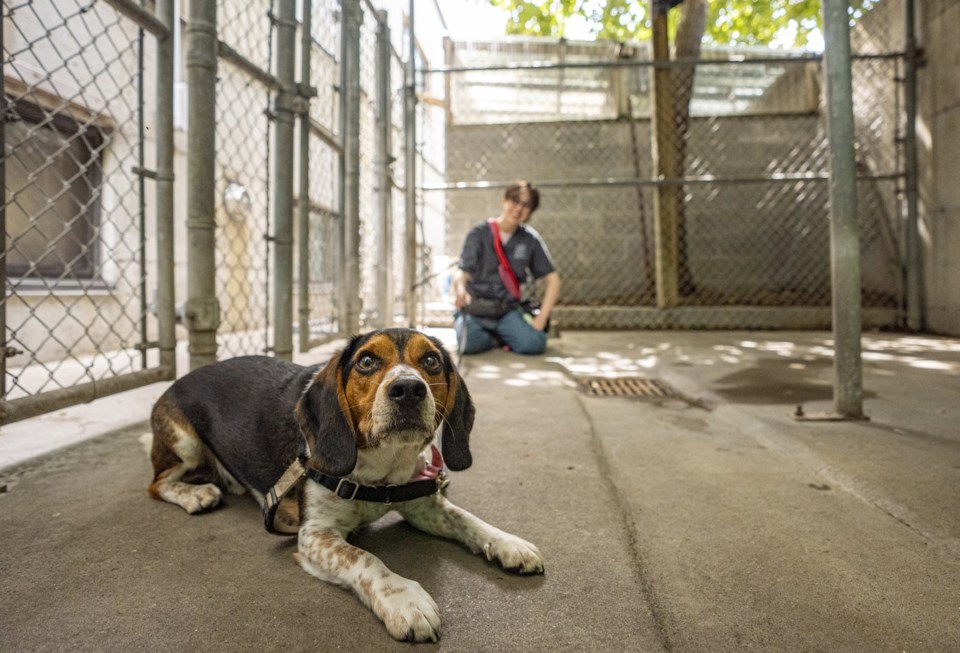MONTREAL — Canada Day has traditionally been synonymous in Montreal with moving day: piles of junk on street corners, sweaty bodies carrying couches up and down the city's winding staircases — and a spike in abandoned animals at shelters.
However, Montreal's SPCA is no longer seeing a big jump in animal surrenders around July 1, but that's not because people have stopped giving up their pets before moving homes.
The shelter says that compared with years past, fewer residential leases terminate at the end of June; therefore, instead of abandoning their pets all at once, Montrealers area leaving their animals behind all year long. And the number of surrendered pets is increasing, a trend that Laurence Massé, executive director of the Montreal SPCA, blames on the high cost of living and on a lack of pet-friendly rentals.
"We used to see a really, really huge increase, a huge discrepancy between the surrenders in July and all of the other months," Massé said in a recent interview.
"We don't tend to see the same increase as previously because people move all year long now."
In the first four months of 2025, the Montreal branch of the SPCA reported 1,212 animals surrendered, a 26 per cent increase over the same period in 2024. The SPCA received 3,000 surrendered pets in 2024.
Ahead of July 1, the SPCA's Montreal facility was already hosting almost 200 animals: nearly 100 cats, 27 dogs, 39 small animals like rabbits, and 25 wild animals. Massé said her organization is already at 112 per cent capacity for cats and 118 per cent for dogs.
"We're never going to leave an animal behind, so we're going to open our offices, we're going to find a foster family," Massé said.
There had been concerns that animal shelters would see a major spike in abandoned pets after the COVID-19 pandemic, when many people had adopted pets during lockdowns. That anticipated wave of animal surrenders never came, but abandonments have been rising due to a complex combination of factors, Massé said.
No-pet clauses in leases are a major problem, Massé said, noting that 52 per cent of Quebec families are pet owners, and 25 per cent of pets are dogs — but just 4.2 per cent of landlords permit dogs in their apartments.
"So it's really, really hard to find a place. So that's one of the biggest factors of surrender."
The SPCA has argued in favour of Civil Code changes to ban no-pet clauses. Opposition party Québec solidaire attempted to bring legislation on the issue in 2023 but failed.
Martin Messier of the Quebec Landlords Association says his members would be more open to allowing pets if the Quebec government permitted landlords to collect deposits for potential pet-related damage. "I think that for a lot of landlords, the problem is never the pet, it's always the pet owner that does not take care properly of their pet."
"We want to make sure that we have a building in good condition … that we have other tenants that are able to enjoy their unit as well," Messier said.
In 2015 Quebec changed the legal status of animals to declare them sentient beings, not property; but legislators didn't change the rules around no-pet clauses, which remain legal.
Lawyer John-Nicolas Morello, head of a non-profit committed to advocating for ethics and animal law, said the SPCA has launched a court challenge against Quebec's rules around no-pet clauses. That case, however, won't be heard for several years.
Other jurisdictions have taken the lead on this issue: France and Ontario, for example, have invalidated no-pet clauses in residential leases.
Morello said his organization supports the SPCA challenge, and in the meantime has created a manual to help guide tenants during lease negotiations so that landlords feel more comfortable with pets.
"Until that (legal challenge) happens, we thought that it was important to try to develop a tool to allow an informed discussion between the landlord and the tenant," Morello said.
But more and more, Massé noted, the consideration to give up a pet is a financial one.
"In the last two years, we tend to see an increase in surrenders for economic reasons," Massé said. "We're living in an inflation context right now and unfortunately people have a hard time affording their own food. So, what about food for the animal?"
The SPCA runs a program that offers food, litter and toys for pets whose owners are struggling financially. Aside from pet necessities, it's difficult for families trying to budget for potential veterinary care.
"So behind every surrender, there's (often) a financial reason, unfortunately, and we're seeing more and more this year," Massé said.
This report by The Canadian Press was first published July 1, 2025.
Sidhartha Banerjee, The Canadian Press




